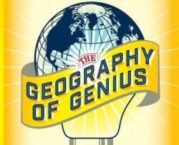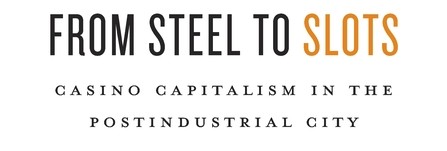No artist has ever depicted Los Angeles like Ed Ruscha. It’s worth a trip to San Francisco to see the de Young’s retrospective.
A Back-to-School Reading List of Books About Cities
2016 has produced an eclectic, imitative mix of titles to the urban library.
Planners in an Age of Globalization
CP&DR’s Josh Stephens caught up with Khanna at the Milken Institute Global Conference to talk about how city form – and the people who guide it – in California and elsewhere can contribute to these global connections.
Intellectual Tourism, Near and Far: Review of ‘The Geography of Genius’
Organized chronologically, each chapter travels to a different city and investigates a different type of genius, spanning some 3,000 years. There’s a fun, parlor-game quality to anticipation, both of what city will come next and of what might qualify as “genius” for Weiner.
Book Review: From Steel to Slots
Chloe E. Taft explores the transition of Bethlehem, Pa., from Rust Belt company town to gambling mecca.
Fetishizing Families: Review of ‘The Human City’
Kotkin has long been a contrarian and critic of contemporary planning — sometimes a perceptive and welcome one, especially when urbanists, myself included, have gotten too cute or too smug. “The Human City” is probably his most comprehensive critique and surely his most off-putting.
Top 10 Books – 2016
Planetizen is pleased to release its list of the ten best books in urban planning, design, and development published in 2015.
The Ultimate Mexican-American: Book Review of How the Gringos Stole Tequila
The worm is a gimmick. So is Cinco de Mayo. And so is much else of tequila culture.
Book Review: Tactical Urbanism: Short-term Action for Long-term Change
Tactical urbanism’s entry into the mainstream comes in the form of the enthusiastic volume Tactical Urbanism: Short-term Action for Long-term Change.
Review of ‘Water to the Angels’
Les Standiford, an accomplished novelist, sets out to tell this gripping story in Water to the Angels: William Mulholland, His Monumental Aqueduct, and the Rise of Los Angeles.
Book Review: ‘City by City’
Tortorici writes like Joan Didion’s cloying little sister, drawing monumental conclusions from vast stores of hearsay, personal experiences, and idle speculation.
Book Review: ‘Robert Moses: Master Builder of New York City’
It’s an odd feeling to see a historical figure represented visually, with his carriage, mannerisms, and emotions on display, often, in Moses’ case, with a beatific look of self-satisfaction.
California Cities and the Innovation Economy: Q&A with Enrico Moretti
In his recent book The New Geography of Jobs, Enrico Moretti, professor of economics at the University of California, Berkeley, explains how cities promote innovation and, importantly, how innovation affects cities’ economies.
California: Looking Forward—or Backward?
As a journalist covering urban planning in the real California, I can’t help thinking that the modes of living that Lepucki imagines surviving in the state’s ashes can be seen as an extreme exaggeration of …
California’s Golden Days: Review of ‘The Rush: America’s Fevered Quest for Fortune, 1848–1853’
As ancient as the history of the gold rush may be — especially by California standards — parallels between contemporary California and infant California are eerily strong.
Book Review: ‘Culture Crash’
‘Culture Crash: The Killing of the Creative Class’ by Scott Timberg argues that cities must defend and support local culture in the face of the homogenizing effects of the creative class.
Top 10 Books – 2015
Planetizen is pleased to release its list of the ten best books in urban planning, design, and development published in 2014.
The Dark Side of Environmental Quality
The trillions of points of light in the true night sky are no match for the mere billions on the ground. You know the culprits: streetlights; parking lots; gas stations; billboards; preening McMansions; “security” lighting; athletic fields; headlights….and on and on. It all piles up in icteritious “domes” that hover above every urban area in the country.






